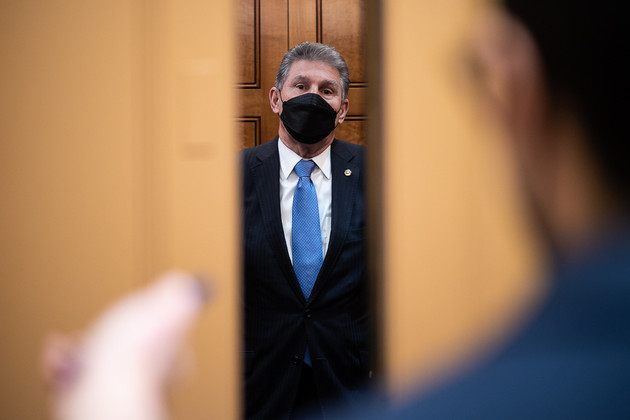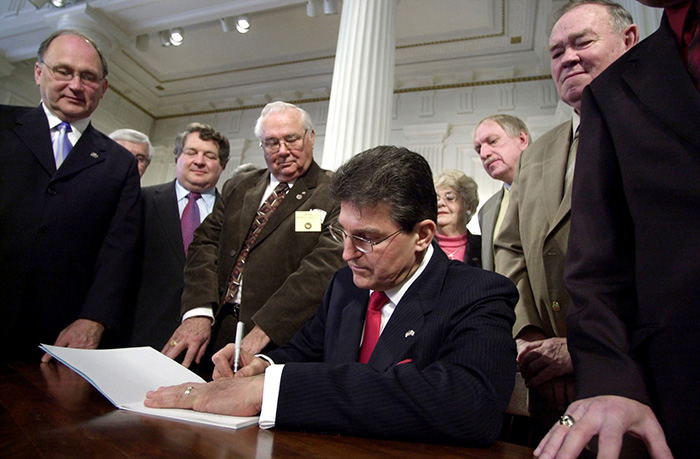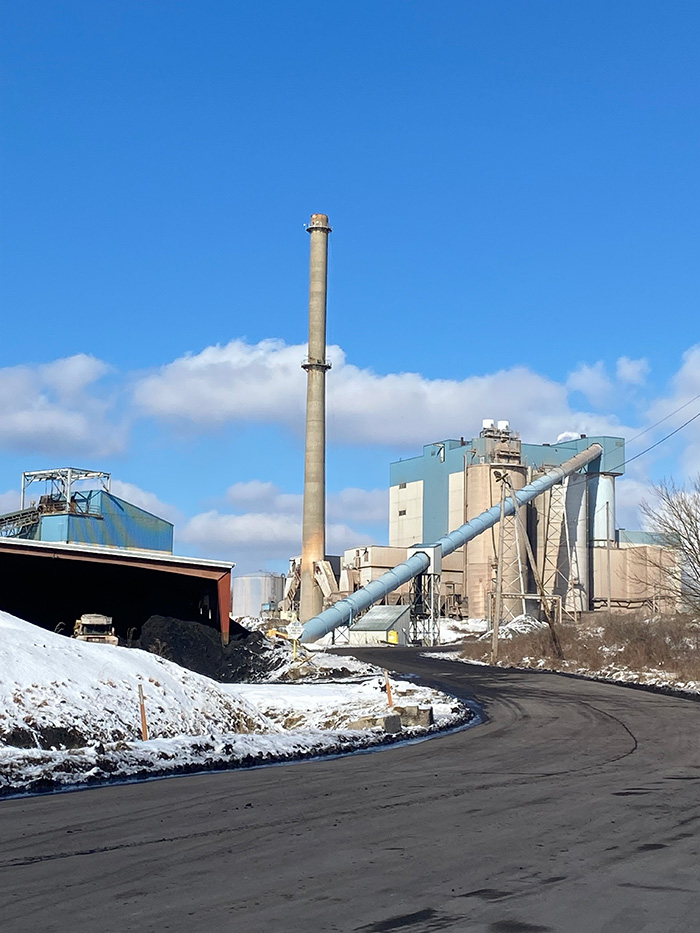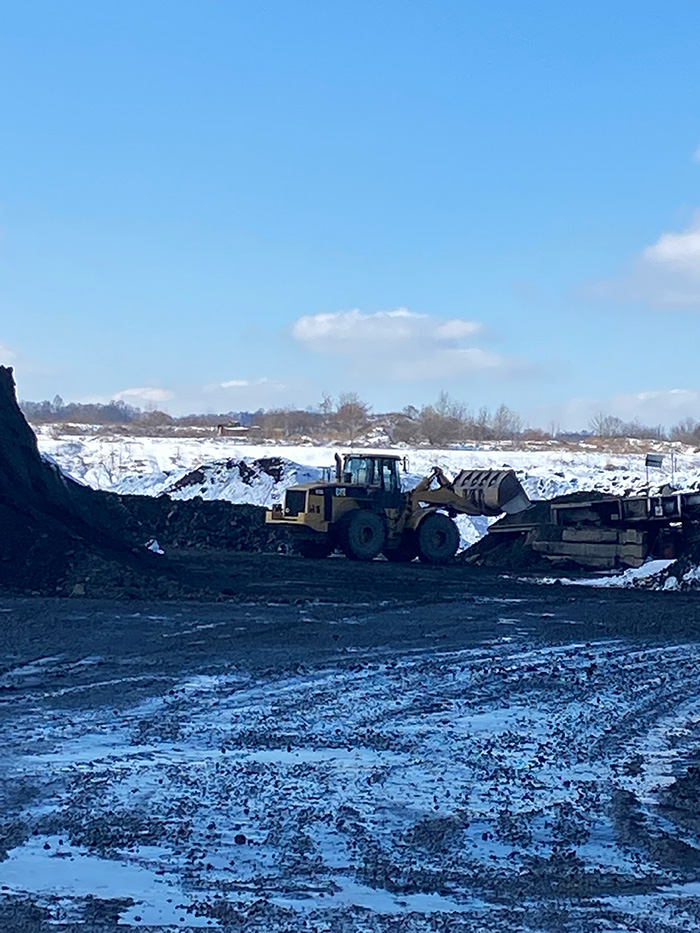
As governor, Joe Manchin supported an unusual detail in a clean energy bill that was moving through the West Virginia Legislature in 2009.
The provision classified waste coal as an alternative energy.
The muddy mix of discarded coal and rocks is one of the most carbon-intensive fuels in America. And Manchin’s family business stood to benefit financially when it was reclassified as something akin to solar, wind and hydropower.
Selling the scrap coal has earned Manchin millions of dollars over three decades, and he has used his political positions to protect the fuel — and a single power plant in West Virginia that burns it — from laws and regulations that also threatened his family business.
It continues today.
Only now Manchin has enormous influence over federal climate policy. He is using his chair role of the energy committee — and role as maverick Democrat – to shape environmental policy across the states.
His opposition in December to a sweeping $1.7 trillion social spending bill known as Build Back Better ruptured one of the most ambitious climate packages in U.S. history.
Then last week Manchin offered what stands to be his final word on the bill: “It’s dead,” he said.
Manchin’s political power over the clean energy sector has national implications today. But he has wielded his influence for years. And one of his main goals has always been to protect coal.
In 2009 he used one of his last actions as governor to sign a renewable energy law. The measure was described as a way to increase the state’s amount of clean power to 25 percent by 2025.
But it also shielded the waste coal that helped build Manchin’s fortune. Classifying it as an alternative energy source allowed utilities to count it toward their renewable electricity goals.
That infuriated some members of his own party, who saw the law as a way to jump-start the state’s transition to a cleaner future. It hasn’t worked. More than a decade after the law was enacted, just 6 percent of the state’s power is derived from renewable sources.
Eighty-eight percent comes from coal.
“Everything that he does, everything that he did when he was governor, everything that he has done while he is a senator, is going to advance his best interest and the interest of the people who put money in his pocket, period,” said Nancy Peoples Guthrie, who was a Democratic state lawmaker at the time. “That’s all you need to know about Joe Manchin.”
As the Build Back Better bill hovered on life support late last year, Manchin used his position as chair of the Energy and Natural Resources Committee to remove a clean energy program from the sprawling package.
The provision could have accelerated the closure of coal plants.
Those maneuvers occurred as Manchin’s family business, Enersystems Inc., continued to sell waste coal to a power plant in his home state named Grant Town. He earned $500,000 from Enersystems last year, according to Senate financial disclosure reports.
Manchin has said he has no control over the family coal business, which is run by his son Joe Manchin IV and resides in a blind trust. Manchin did not respond to multiple requests for comment.
Yet over the arc of Manchin’s political career he has pushed measures to promote the coal that Enersystems removes from abandoned mines, nominated officials who helped ensure that the power plant that buys most of that company’s coal did not close, and waged political battles against environmental regulations that threatened the same plant.
Without any one of those decisions, Grant Town might have closed, leaving Manchin’s family business without its top customer.
That has created a “huge conflict of interest problem” for Manchin, said Walter Shaub, who ran the U.S. Office of Government Ethics during the Obama administration.
“All of this is stuff that is so insane, any person who has no interest in any of this would clearly say this should be against the rules, but then the people who get in the position to change the rules have these conflicts and they have no interest in solving them,” said Shaub, who is now a senior ethics fellow at the nonpartisan Project On Government Oversight.
There is no indication that Manchin has broken any laws. To many, he’s a champion of his constituents. His actions have benefited the coal industry in West Virginia, along with the families and businesses that rely on it. In some cases, his efforts can be described as environmentally friendly, since removing waste coal from abandoned mines can protect waterways.
Yet many of Manchin’s political decisions also stood to benefit him personally.
In 2006, when Manchin was governor, he intervened in an electricity rate case as officials with the Grant Town power plant were warning that the facility might close. Manchin directed his chief of staff, Larry Puccio, to help convince officials with Monongahela Power Co., which buys power from the plant, to support the rate increase, according to a person involved in the discussions.
Puccio denied being involved in the rate case in a brief interview with E&E News last week.
“I don’t remember anything about that,” Puccio said. “I would have never called anybody and asked them to join in or anything like that.”
The Intercept first reported on Puccio’s involvement.
The state Public Service Commission, which was led by a Manchin appointee at the time, approved the plant’s request. The decision averted a potential closure of the plant by raising rates on West Virginia electricity customers. It also extended the plant’s contract with Monongahela Power, a subsidiary of FirstEnergy Corp., by eight years, to 2036.
Puccio is now a lobbyist for FirstEnergy, and Grant Town is the biggest customer of Enersystems, Manchin’s family business.
Years later, as a U.S. senator, Manchin helped fight off attempts by the Obama administration to more strictly regulate coal ash, a toxic byproduct of waste coal. The proposed rules might have led to the closure of power plants that burn the discarded coal, analysts said. Manchin’s family company also makes money by hauling coal ash away from Grant Town.
Then, last year, Manchin crafted a bipartisan infrastructure bill that includes a provision to increase federal funding for clearing abandoned mine sites of waste coal and other contaminants — the type of work that’s performed by Enersystems. President Joe Biden signed the legislation into law.
Today, Grant Town is the only power plant in West Virginia that still burns waste coal. And it buys almost all of its fuel from Enersystems, according to public documents.
Questions about Manchin go back 30 years

It was in 1988 when Manchin, then a state senator in his early 40s, founded the company that would become Enersystems.
The company scoops up the coal waste — also known as gob — that’s buried in mud, clay and slate from defunct mines and trucks it to Grant Town. There are only 11 power plants in the U.S. that still use coal waste to generate electricity.
Grant Town ran almost entirely on coal purchased from Manchin’s family company last year, according to the U.S. Energy Information Administration. The plant has long been under contract to sell its power to a subsidiary of utility giant FirstEnergy Corp., creating a guaranteed revenue stream that many other plants don’t enjoy.
That contract has been a key to Grant Town’s survival, even as the agreement drove up utility bills in one of the poorest states in the country.
Grant Town was opened in 1993. The first recorded incident of Manchin using his political position to treat the plant favorably came in 1995, about 12 years after Manchin was elected to the state Legislature.
He backed a measure that would give tax breaks to power plants in West Virginia that burned waste coal. There were three at the time. Grant Town is the only one that’s still open. The bill saved Grant Town almost $300,000 in annual taxes, even as local groups pointed out Manchin’s alleged conflict of interest.
Manchin shrugged it off. The lawmaker said he had been cleared by the state ethics board because he was voting for a policy that would affect multiple plants, not just Grant Town.
“I would have excused myself from voting,” if the only plant affected was Grant Town, Manchin told The Charleston Gazette at the time.
By 2006, when Manchin was governor, the plant’s owners went before the West Virginia Public Service Commission and claimed it was on the verge of shutting down.
The commission, then chaired by Jon McKinney, a Manchin appointee, raised the rate that Grant Town could charge for its electricity from $27.25 per megawatt to $34.25. They also gave the plant a way to stay in business longer, by extending its power purchase agreement with FirstEnergy by eight years to 2036.
Those changes still reverberate today. West Virginia has seen some of the highest electricity rate increases in the nation. Its loyalty to coal is one reason for that.
The price of residential power in a dozen other states that share the PJM grid with West Virginia has declined, according to a report released last month from the West Virginia University’s Bureau of Business and Economic Research.
“Over the past 10 years, West Virginia’s residential prices have risen, while PJM’s average price has come down considerably,” the report found.
Between 2010 and 2019, utility bills in West Virginia rose at five times the national average, according to calculations by James Van Nostrand, a West Virginia University professor who spent 22 years as a lawyer representing energy clients in state regulatory proceedings.
Power prices are higher in West Virginia in part because coal is more expensive than natural gas and renewables. In other states, aging coal plants that can’t compete economically are allowed to shut down.
Coal ash fight boosts Grant Town — and Manchin

When trucks for the Manchin family business pull up to Grant Town, they earn money by coming and going. They deliver waste coal, which is burned by the plant to make electricity. And then they’re filled up with coal ash.
Manchin has fought regulations on coal ash for years, but he doesn’t mention that his own income could be affected by the higher costs imposed by the regulations on ash disposal.
The ash that’s left over from burning waste coal creates a significant environmental toll, said Mike Ewall, executive director of the Energy Justice Network. It contains high levels of toxic metals that can harm humans when it’s inhaled or leaches into drinking water.
Coal ash regulations would classify the material as a hazardous waste and create more rigorous requirements for storing and transporting the ash. It would also increase costs on businesses that move the substance.
Ewall said the industry has fought coal ash regulations because increased costs could be the “kiss of death” for plants that are barely hanging on, such as Grant Town.
“At this point it would probably break them. It would probably force them to close because they’re already barely surviving in this industry,” Ewall said. “Waste coal is even less economical than the larger coal plants. Add anything on top of that and that is why the industry has fought coal ash being labeled as hazardous waste.”
In 2010, months before Manchin was elected to the Senate, he began to fight plans by the Obama administration to classify coal ash as a hazardous waste. The designation would harm “families who rely on the jobs related to coal combustion products,” Manchin said in a press release at the time.
“Hastily raising its status to ‘hazardous’ could actually cause more environmental harm and place undue financial burden on countless thousands of Americans,” Manchin said.
He never gave up that fight.
Finally, in the last year of the Obama administration, Manchin successfully sidetracked a plan to give EPA more power to prevent heavy metals from leaching into ecosystems through coal ash regulations. Instead, Manchin co-sponsored the Coal Combustion Residuals Regulatory Improvement Act, which was passed as part of a larger water protection bill in 2016.
The bill allowed states to set their own standards for recycling and reusing coal ash. That meant West Virginia could impose coal ash disposal programs that were less restrictive than those proposed by EPA. More importantly, it also blocked an EPA rule finalized in 2015 that permitted states to sue other states with weak coal ash disposal standards.
There was another likely outcome: lower costs for companies that handled coal ash, like Enersystems.
“The overregulation of coal ash by the EPA would threaten vital industries and unnecessarily cost West Virginia and the nation more jobs,” Manchin said at the time, echoing the comments he made as a governor.
Manchin isn’t alone in his advocacy. The coal industry has spent years lobbying against coal ash regulations because of the costs it could impose on the fossil fuel industry.
Old coal piles are hazardous — and profitable

The gob burned at Grant Town produces more ash than other types of coal. The power plant removes 530,000 tons of coal refuse annually and produces 430,000 tons of ash, according to a 2017 PSC document filing.
In 2020 alone, ash from Grant Town laden with tens of thousands of pounds of heavy metals have been spread across three former mine sites, EPA figures show. That includes more than 25,000 pounds of arsenic, 36,000 pounds of nickel compounds and 24,000 pounds of lead.
Because waste coal is blended with lime before it is burned, the alkaline ash can be reapplied to abandoned mine sites to absorb acid mine runoff. The ash is also mixed with drilling mud from oil and gas operations to cut down on its heavy acid content.
The $1.2 trillion bipartisan infrastructure bill that Manchin shepherded through the Senate last year could provide new funding for removing waste coal.
The national Abandoned Mine Lands Reclamation Fund has been reduced to about $2 billion, but the infrastructure bill devotes more than $11 billion to cleaning up former mines. The fund has been steadily dwindling as more coal mines, which pay fees that support the fund, go bankrupt.
Replenishing the money is a lifeline to former coal communities that are trying to clean up polluted waterways, and redevelop former mine sites.
It could also be a boon for companies involved in the cleanup of waste coal from former mine sites, such as Enersystems.
Waste coal power plants can benefit from federal funding for abandoned mines because states will contract out the removal of gob from those sites, said Jaret Gibbons, executive director of the Appalachian Region Independent Power Producers Association, which represents waste coal plants.
Still, he said it doesn’t mean that power plants burning waste coal will automatically see an infusion of cash. He said there are often more urgent remediation needs that take up most of the funding.
Coal waste power plants were not initially constructed purely for economic reasons, he added. The plants were meant to serve a valuable purpose — cleaning up mine waste — and were not designed to be profitable.
“They were incentivized primarily by the state government to encourage private mine land reclamation,” Gibbons said. “We look at these as a policy tool in partnership with the state to clean up these abandoned mine lands and bring in private funding for energy sales to help fund the mine land reclamation.”
'Highly unusual and questionable'
Right now, Grant Town is at another crossroads. And its fate hangs in the balance.
The power plant is warning again that it’s facing dire financial circumstances. Its owners have been trying to get FirstEnergy to buy out a power purchase contract between the plant and the utility, so the plant can generate electricity for cryptocurrency mining.
FirstEnergy balked at that plan, partially out of concern that it was too risky and could force Grant Town to close, according to PSC documents filed in November.
That raised eyebrows. It’s unusual for a utility to show an interest in keeping uneconomic power plants open, because it can result in higher prices for its customers. Grant Town’s financial struggles have cost FirstEnergy ratepayers an additional $117 million over the last five years, according to public documents.
“The utility must be indifferent to the financial circumstances” of the plant or ratepayers will face high costs, said James Van Nostrand, director of the Center for Energy and Sustainable Development at the West Virginia University’s College of Law.
“A utility would typically not care what happens to a plant once the contract is terminated and it ceases purchasing the output from a plant,” he added. “This is not a typical situation, however, given that Mon Power and the PSC have gone to great lengths to keep the plant operating for reasons that are highly unusual and questionable.”
In December, West Virginia regulators blocked Grant Town’s cryptocurrency proposal.
FirstEnergy’s interest in keeping Grant Town open comes as the utility lobbies Manchin on separate energy legislation. It’s also a top campaign contributor to a Manchin-affiliated political action committee.
A FirstEnergy spokesperson said there are no ethical concerns about having a contract with a power plant that does business with Manchin.
“We do not believe the Grant Town contract presents a conflict of interest,” FirstEnergy spokesperson Will Boye said in a statement. “Any buyout offer will be evaluated solely for its potential benefits, or lack thereof, to Mon Power customers.”
He added: “Mon Power is concerned about any job losses that could result from a potential plant closure.”
FirstEnergy was the top contributor in the 2020 cycle to Manchin’s affiliated political action committee, contributing some $50,000, according to campaign finance reports compiled by OpenSecrets.org. So far in the current election cycle, it has donated $36,000 to Manchin’s leadership PAC and his campaign.
FirstEnergy has also recently lobbied on two Manchin-sponsored bills, federal lobbying records show. That includes the Energy Infrastructure Act that steers money toward abandoned mine land cleanup, the type of work that Manchin’s family company is engaged in. The other bill is the Enhancing Fossil Fuel Energy Carbon Technology Act, which would boost carbon capture for aging coal plants and allow them to operate longer.
Manchin’s business interests reflect long-standing ethical questions in Congress, said Shaub, the former government ethics official. Lawmakers have the power to prevent obvious conflicts of interest. But neither party has changed its rule to stop members from making money off their votes in the Capitol, he said.
“Nobody put a gun to their head and said you have to be a member of Congress. People can choose to be successful businesspeople and pursue any form of happiness that they can legally pursue,” he said. “But if they want to be in Congress they are asking the American people to vest them with a great deal of power over our lives, then it’s not too much to ask them to eliminate the conflicts of interest.”
A version of this report first ran in E&E News' Climatewire. Get access to more comprehensive and in-depth reporting on the energy transition, natural resources, climate change and more in E&E News.
----------------------------------------
By: Scott Waldman
Title: How Manchin used politics to protect his family coal company
Sourced From: www.politico.com/news/2022/02/08/manchin-family-coal-company-00003218
Published Date: Tue, 08 Feb 2022 04:30:00 EST






